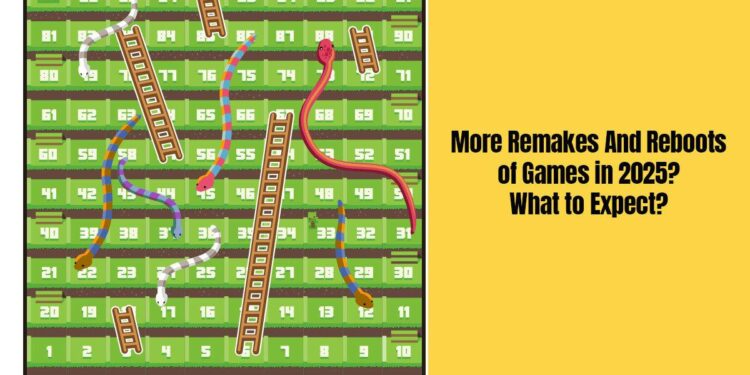The gaming industry has always been a dynamic and evolving space where trends change rapidly to meet audience preferences and technological advancements. One such trend that has been growing in recent years is remakes and reboots. 2025 is expected to see this trend continue as gaming studios take advantage of nostalgia but infuse it with modern improvements.
Here is what gamers can expect from the surge in remakes and reboots in the next year.
The Rise Of Nostalgia In Gaming
Nostalgia is a potent tool. As gamers from the 1990s and early 2000s grow older, their yearning to relive childhood favorites increases exponentially. Remakes and reboots do this, bringing out class titles to a new audience who have not played them before. This is why people still love playing Snakes and Ladders online. Final Fantasy VII Remake and Resident Evil 4 Remake proved that projects with high emotional attachment are commercially viable and critically acclaimed.
2025 will only see more of these great classics return to the limelight. Studios are revisiting their back catalogs to identify gems that can be modernized while retaining the essence that made them special.
Upcoming Game Remakes And Reboots Of 2025
Even though some titles are yet to be officially announced, industry rumors and trends give a peek into what is in store. Here are some of the most anticipated remakes and reboots:
- Metal Gear Solid 3: Snake EaterRumor has it that the game may be remade in a high-definition edition, possibly combining the excellent storyline of the game and gameplay with current graphics and audio.
- Elder Scrolls: MorrowindMany fans called for the game’s remake. Some rumors report that this year, which is 2025, this might be realized. Improved graphics while retaining its complex history would attract so many RPG followers.
- Silent Hill 2: The remake of Silent Hill 2 will set the bar for psychological horror gaming, given the recent announcement by Konami about their renewed focus on the Silent Hill franchise.
- Prince of Persia: The Sands of TimeUbisoft’s revisitation of this classic title has seen delays, but 2025 might be the year it reemerges with improved visuals and refined mechanics.
Why Are Remakes And Reboots Thriving?
The comeback of remakes and reboots isn’t a matter of chance. There are several reasons why this is happening:
- Advancements in technology: Gaming technology has evolved rapidly, offering studios an opportunity to revive old titles. Good-quality high-definition graphics and realistic physics make it possible to play these games as though they are new.
- Increasing customer base: The game has now become more popular. Many customers are now willing to try out the classics that they missed during the original run. Remakes and reboots can be an entry point for them.
- Risk management: Remakes and reboots involve relatively lower risks compared to a brand-new IP. They already benefit from existing fan bases and familiarity, which means a smaller marketing cost but with promising returns.
- Cultural impact: Many of the old games have acquired cultural value; studios revisit the titles to ensure their legacies continue living. It also aligns with a broader media trend: remaking popular content across film, TV, and music.
Challenges For Remakes And Reboots
The trend is encouraging but not without challenges. Studios have to walk a fine line between staying faithful to the original and making meaningful improvements. Missteps can alienate fans, as seen with controversial remakes that failed to capture the spirit of their predecessors.
Key challenges are:
- Managing fan expectations: Fans of the original can be vocal about changes they perceive as unnecessary or detrimental. Studios must balance nostalgia with innovation.
- Budget issues: The bar is always high for remakes and reboots, which typically are costly to produce. Finding the balance between quality and fiscal responsibility is a big challenge.
- Over-saturation: Remaking and rebooting will make a market over-saturated at some point. With too many remakes and reboots, returns are bound to diminish because the player base gets tired of reliving old content.
General Trends Impacting 2025’s Launches
Some of the larger gaming industry trends are shaping how remakes and reboots are approached:
- AI and machine learning: AI-powered tools are allowing studios to upscale graphics and refined gameplay mechanics at a faster pace than ever, making remakes a more viable option than ever.
- Cross-platform play: Remakes are increasingly optimized for cross-platform compatibility, ensuring a broader audience can access them, regardless of their device.
- Cloud gaming: With the rise of cloud gaming, remakes can reach audiences who might not own high-end hardware, which democratizes access to these gaming classics.
- Community engagement: Studios engage players through feedback during development, even incorporating fan communities to ensure remakes meet expectations.
The Future Of Remakes And Reboots
Going beyond 2025, the trend of remakes and reboots will continue. With gaming technology continuing to evolve, studios will find new ways to enhance classic titles. Virtual reality (VR) and augmented reality (AR) could play a huge role, offering immersive reinterpretations of iconic games.
Furthermore, attention may be drawn to underappreciated titles that did not gain commercial success when they were first released. This way, studios can diversify their offerings while catering to niche audiences by giving these hidden gems a second chance.
Conclusion
The gaming landscape in 2025 is going to be a nostalgic yet innovative space, with remakes and reboots taking center stage. Whether it is reimagining beloved classics or new takes on iconic franchises, these promise to deliver a mix of familiarity and novelty. However, success will only depend on finding the perfect balance between honoring the past and embracing the future. As gamers, all we can do is sit back and eagerly await the next wave of remade magic.











































































































